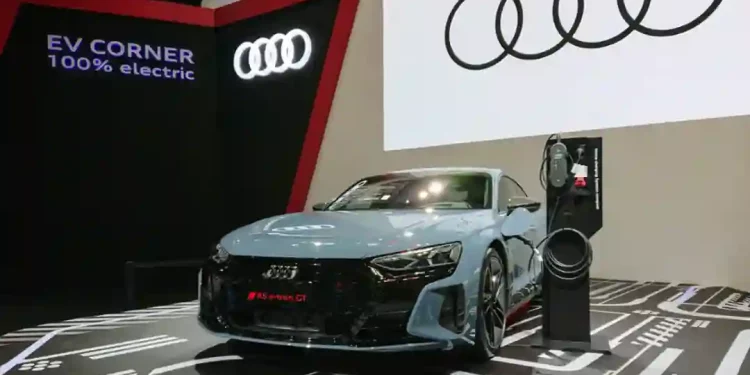Chinese and Japanese automakers are vying for the biggest share of Thailand’s emerging EV market. Siam Motors, the oldest automotive company in Thailand, has been in a partnership with Nissan Motors since 1962. The company went from being a vehicle dealer to an automotive pioneer thanks to a factory that produced four cars per day and a lucrative, long-lasting partnership with Japanese companies. The Thai family-owned company, however, whose yearly revenues have increased to $7 billion due to its success, is now seeking chances abroad.
Based on the previously undisclosed discussions, Siam Motors is in contact with numerous Chinese automakers regarding possible alliances, particularly for high-end electric vehicles. Sebastien Dupuy, Siam Motors’s Vice president, made this statement. According to him, Electronic Vehicles will present a wonderful growth area, and the company wants to take advantage of its expanding demand.
The position of Siam Motors reflects a rapid change occurring in Thailand. It is where Chinese investments have amounted to $1.44 billion since 2020, including those of BYD and Great Wall Motor, and have opened a new front in a sector that Japanese manufacturers have hitherto dominated.
EV Battle Between China and Japan
Based on the current registration data, several industry officials and analysts have predicted that Japanese automakers are currently engaged in a fight for yet another important Asian market as a result of their cautious approach to Electronic Vehicles, which came hot on the heels of a sales crisis in China.
Thailand’s car sector is already beginning to change as Chinese Electronic Vehicle manufacturers bring in their suppliers and local Thai businesses, particularly those with strong ties to Japanese enterprises like Siam Motors, look for new collaborations.
As Southeast Asia’s second-largest car producer and exporter, Thailand is also known for having the second-largest sales market after Indonesia. Due to their overwhelming dominance, Japanese automakers have considered this market nearly an extension of their home market for decades.
Since last year, China has become Thailand’s top foreign investor after Japan. This increased BYD’s investment in a new plant they will create in 2024. It was done to attract Chinese investors. As Chinese automakers boost exports and establish overseas production hubs, partially in reaction to a hypercompetitive domestic market for electric cars, Thailand’s transition provides a test case for other economies.
Thailand aims to convert all vehicles into EVs
With ambitions to become the primary regional production hub, Thailand actively seeks investment. By 2030, it hopes to convert about 30% of its 2.5 million annual car output into EVs.Thailand has been luring Chinese Electronic Vehicle manufacturers with its ready subsidies and established supply infrastructure, mostly created for Japanese automakers.
These comprise reduced import duties in exchange for subsequent local assembly and a few tax advantages for Electronic Vehicle production.
Narit Therdsteerasukdi, Thailand’s Board of Investment Secretary General, commented that if they wished to be the Electronic Vehicle hub of a particular region, they would need to expand more instead of just building a car assembly. He also stated that they would need to strengthen the ecosystem of Electronic Vehicles. So far, Great Wall, a Chinese automobile manufacturer, has been selected as Thailand’s regional hub for EVs.The managing director of its Thailand arm, Narong Sritalayon, stated that it has a strong infrastructure, supplier, and talent base, and great potential to grow.
Major investments underway
This year, Great Wall has already made an early move by acquiring a factory from General Motors (an American automotive manufacturing company). It had invested 22.6bn baht ($647.38m) and converted the factory into a regional production centre for EVs and other hybrid cars.
Next year it will start producing its EV vehicles called Ora Good Cat EV. MIND Electronics, HYCET, and Nobo Auto are other subsidiaries that will design electronics, powertrains, and seating.
Another Chinese-based Electronic Vehicle giant BYD is investing 17.9bn baht to set up a new facility in Thailand. It will begin producing 150,000 passenger cars per year in 2024. Some of it will be exported to parts of Southeast Asia and Europe.
Other projects in the pipeline
According to the Thailand Board of Investment (BOI), several projects are in the pipeline, which are pursuing Chinese automakers. In collaboration with Ford and Mazda, the State-owned Chongqing Changan Automobile is planning to invest 9.8bn baht to set up its right-hand drive EV factory outside China.
Another state-owned automaker Guangzhou Automobile Group (GAC), whose subsidiary is GAC Aion, will invest more than 6.4bn baht to produce EVs in Thailand.
Chinese EVs are gaining in popularity In Thailand
The EV models of China have slowly been gaining popularity in Thailand. More than 31,000 EVs have been registered in Thailand so far in 2023. This was nearly three times more than the year 2022. The cheapest variant of Great Wall’s Ora Good Cat, one of Thailand’s best-selling EVs last year, currently costs around 828,500 baht. The price gaps between EV Cars and other engine cars have also been reduced due to government subsidies.

















